Comparative Analysis of Project Manager and Scrum Master Roles
VerifiedAdded on 2023/03/20
|17
|4691
|48
Report
AI Summary
This research report provides a comparative analysis of the roles of a project manager and a scrum master within the context of agile project management. The paper begins by outlining the problem statement, which highlights the challenges in distinguishing between the two roles. It then provides an overview of agile project management and the scrum framework, emphasizing the iterative and collaborative nature of these methodologies. The core of the report delves into the distinct responsibilities of a project manager, including project scope definition, activity planning, resource planning, schedule development, cost estimation, budget development, risk analysis, and progress monitoring. In contrast, the report examines the role of a scrum master as a coach and facilitator, focusing on team development and ensuring the successful execution of sprints. The report highlights the qualities of a successful scrum master and their key responsibilities within the scrum framework. The analysis emphasizes the differences between the project manager and scrum master, despite their shared goal of project success. The report concludes with recommendations based on the effective management of a project.
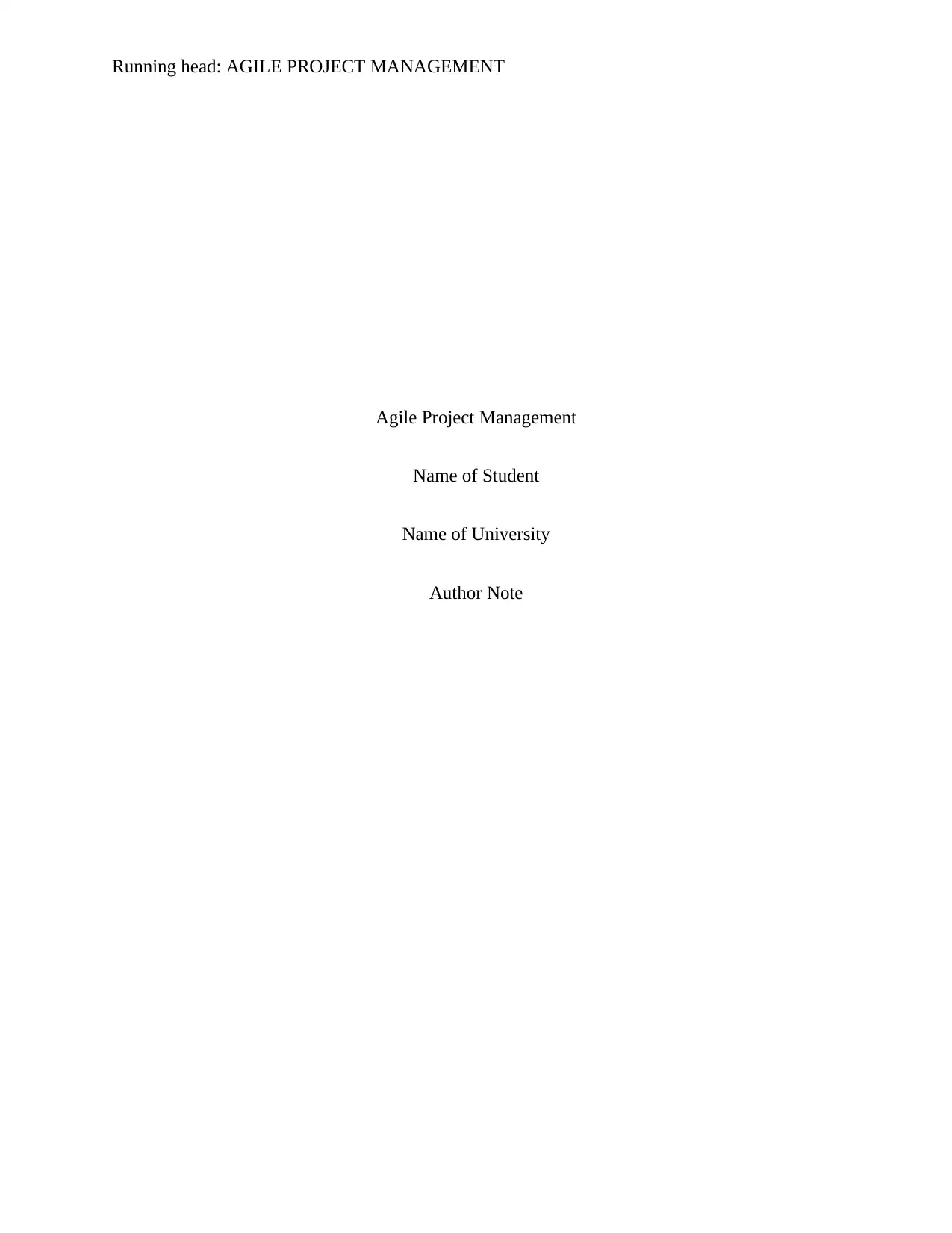
Running head: AGILE PROJECT MANAGEMENT
Agile Project Management
Name of Student
Name of University
Author Note
Agile Project Management
Name of Student
Name of University
Author Note
Paraphrase This Document
Need a fresh take? Get an instant paraphrase of this document with our AI Paraphraser
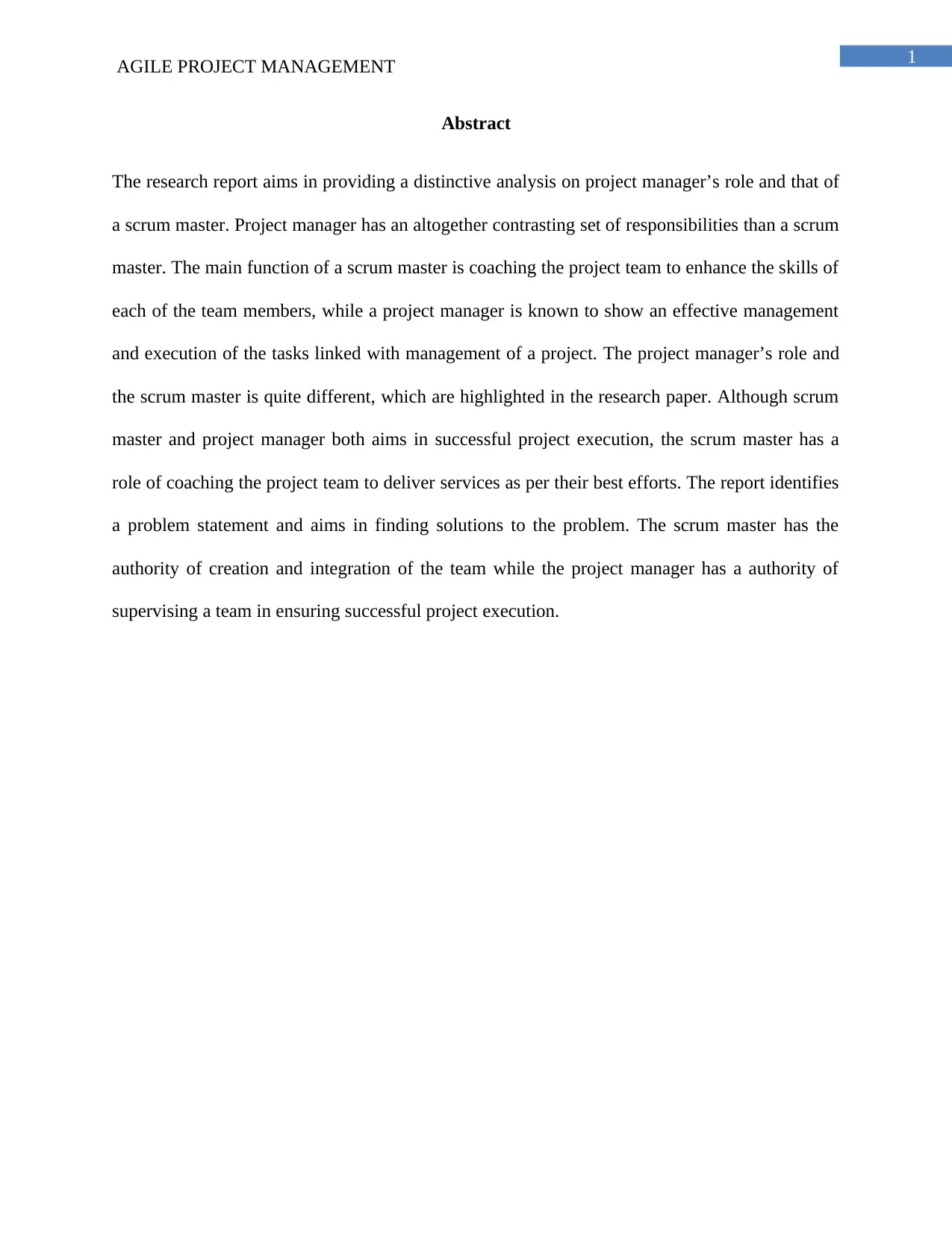
1
AGILE PROJECT MANAGEMENT
Abstract
The research report aims in providing a distinctive analysis on project manager’s role and that of
a scrum master. Project manager has an altogether contrasting set of responsibilities than a scrum
master. The main function of a scrum master is coaching the project team to enhance the skills of
each of the team members, while a project manager is known to show an effective management
and execution of the tasks linked with management of a project. The project manager’s role and
the scrum master is quite different, which are highlighted in the research paper. Although scrum
master and project manager both aims in successful project execution, the scrum master has a
role of coaching the project team to deliver services as per their best efforts. The report identifies
a problem statement and aims in finding solutions to the problem. The scrum master has the
authority of creation and integration of the team while the project manager has a authority of
supervising a team in ensuring successful project execution.
AGILE PROJECT MANAGEMENT
Abstract
The research report aims in providing a distinctive analysis on project manager’s role and that of
a scrum master. Project manager has an altogether contrasting set of responsibilities than a scrum
master. The main function of a scrum master is coaching the project team to enhance the skills of
each of the team members, while a project manager is known to show an effective management
and execution of the tasks linked with management of a project. The project manager’s role and
the scrum master is quite different, which are highlighted in the research paper. Although scrum
master and project manager both aims in successful project execution, the scrum master has a
role of coaching the project team to deliver services as per their best efforts. The report identifies
a problem statement and aims in finding solutions to the problem. The scrum master has the
authority of creation and integration of the team while the project manager has a authority of
supervising a team in ensuring successful project execution.
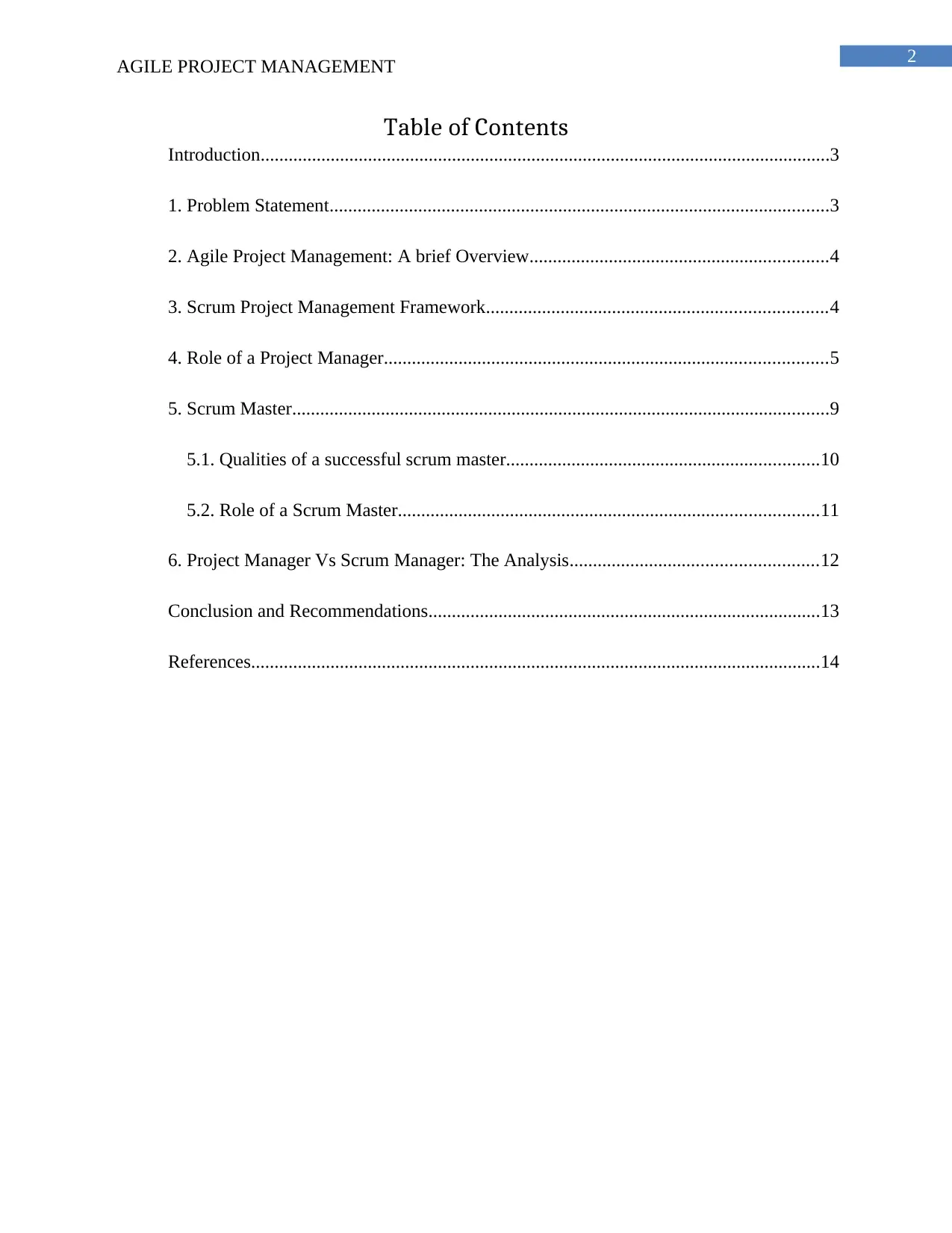
2
AGILE PROJECT MANAGEMENT
Table of Contents
Introduction..........................................................................................................................3
1. Problem Statement...........................................................................................................3
2. Agile Project Management: A brief Overview................................................................4
3. Scrum Project Management Framework.........................................................................4
4. Role of a Project Manager...............................................................................................5
5. Scrum Master...................................................................................................................9
5.1. Qualities of a successful scrum master...................................................................10
5.2. Role of a Scrum Master..........................................................................................11
6. Project Manager Vs Scrum Manager: The Analysis.....................................................12
Conclusion and Recommendations....................................................................................13
References..........................................................................................................................14
AGILE PROJECT MANAGEMENT
Table of Contents
Introduction..........................................................................................................................3
1. Problem Statement...........................................................................................................3
2. Agile Project Management: A brief Overview................................................................4
3. Scrum Project Management Framework.........................................................................4
4. Role of a Project Manager...............................................................................................5
5. Scrum Master...................................................................................................................9
5.1. Qualities of a successful scrum master...................................................................10
5.2. Role of a Scrum Master..........................................................................................11
6. Project Manager Vs Scrum Manager: The Analysis.....................................................12
Conclusion and Recommendations....................................................................................13
References..........................................................................................................................14
⊘ This is a preview!⊘
Do you want full access?
Subscribe today to unlock all pages.

Trusted by 1+ million students worldwide
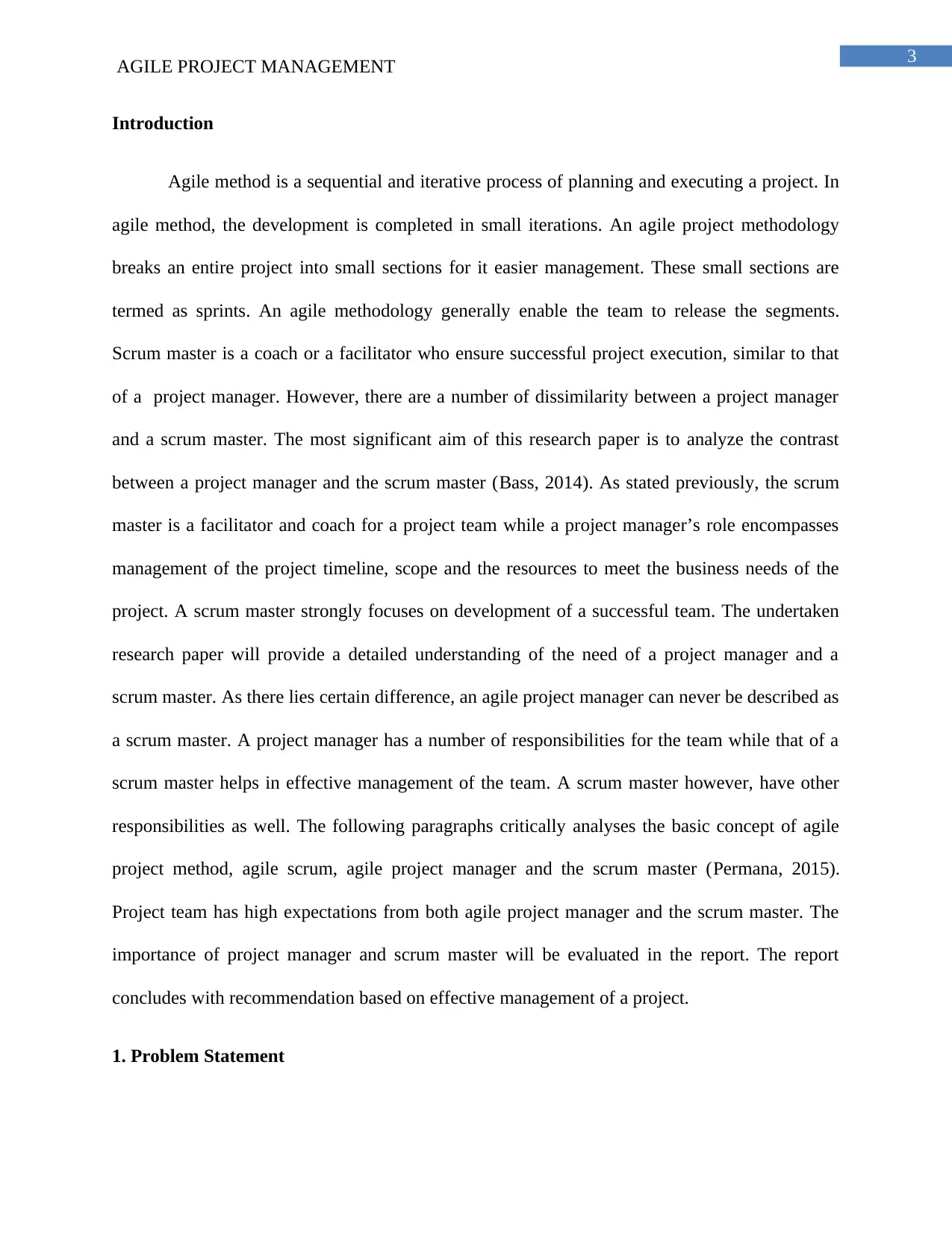
3
AGILE PROJECT MANAGEMENT
Introduction
Agile method is a sequential and iterative process of planning and executing a project. In
agile method, the development is completed in small iterations. An agile project methodology
breaks an entire project into small sections for it easier management. These small sections are
termed as sprints. An agile methodology generally enable the team to release the segments.
Scrum master is a coach or a facilitator who ensure successful project execution, similar to that
of a project manager. However, there are a number of dissimilarity between a project manager
and a scrum master. The most significant aim of this research paper is to analyze the contrast
between a project manager and the scrum master (Bass, 2014). As stated previously, the scrum
master is a facilitator and coach for a project team while a project manager’s role encompasses
management of the project timeline, scope and the resources to meet the business needs of the
project. A scrum master strongly focuses on development of a successful team. The undertaken
research paper will provide a detailed understanding of the need of a project manager and a
scrum master. As there lies certain difference, an agile project manager can never be described as
a scrum master. A project manager has a number of responsibilities for the team while that of a
scrum master helps in effective management of the team. A scrum master however, have other
responsibilities as well. The following paragraphs critically analyses the basic concept of agile
project method, agile scrum, agile project manager and the scrum master (Permana, 2015).
Project team has high expectations from both agile project manager and the scrum master. The
importance of project manager and scrum master will be evaluated in the report. The report
concludes with recommendation based on effective management of a project.
1. Problem Statement
AGILE PROJECT MANAGEMENT
Introduction
Agile method is a sequential and iterative process of planning and executing a project. In
agile method, the development is completed in small iterations. An agile project methodology
breaks an entire project into small sections for it easier management. These small sections are
termed as sprints. An agile methodology generally enable the team to release the segments.
Scrum master is a coach or a facilitator who ensure successful project execution, similar to that
of a project manager. However, there are a number of dissimilarity between a project manager
and a scrum master. The most significant aim of this research paper is to analyze the contrast
between a project manager and the scrum master (Bass, 2014). As stated previously, the scrum
master is a facilitator and coach for a project team while a project manager’s role encompasses
management of the project timeline, scope and the resources to meet the business needs of the
project. A scrum master strongly focuses on development of a successful team. The undertaken
research paper will provide a detailed understanding of the need of a project manager and a
scrum master. As there lies certain difference, an agile project manager can never be described as
a scrum master. A project manager has a number of responsibilities for the team while that of a
scrum master helps in effective management of the team. A scrum master however, have other
responsibilities as well. The following paragraphs critically analyses the basic concept of agile
project method, agile scrum, agile project manager and the scrum master (Permana, 2015).
Project team has high expectations from both agile project manager and the scrum master. The
importance of project manager and scrum master will be evaluated in the report. The report
concludes with recommendation based on effective management of a project.
1. Problem Statement
Paraphrase This Document
Need a fresh take? Get an instant paraphrase of this document with our AI Paraphraser
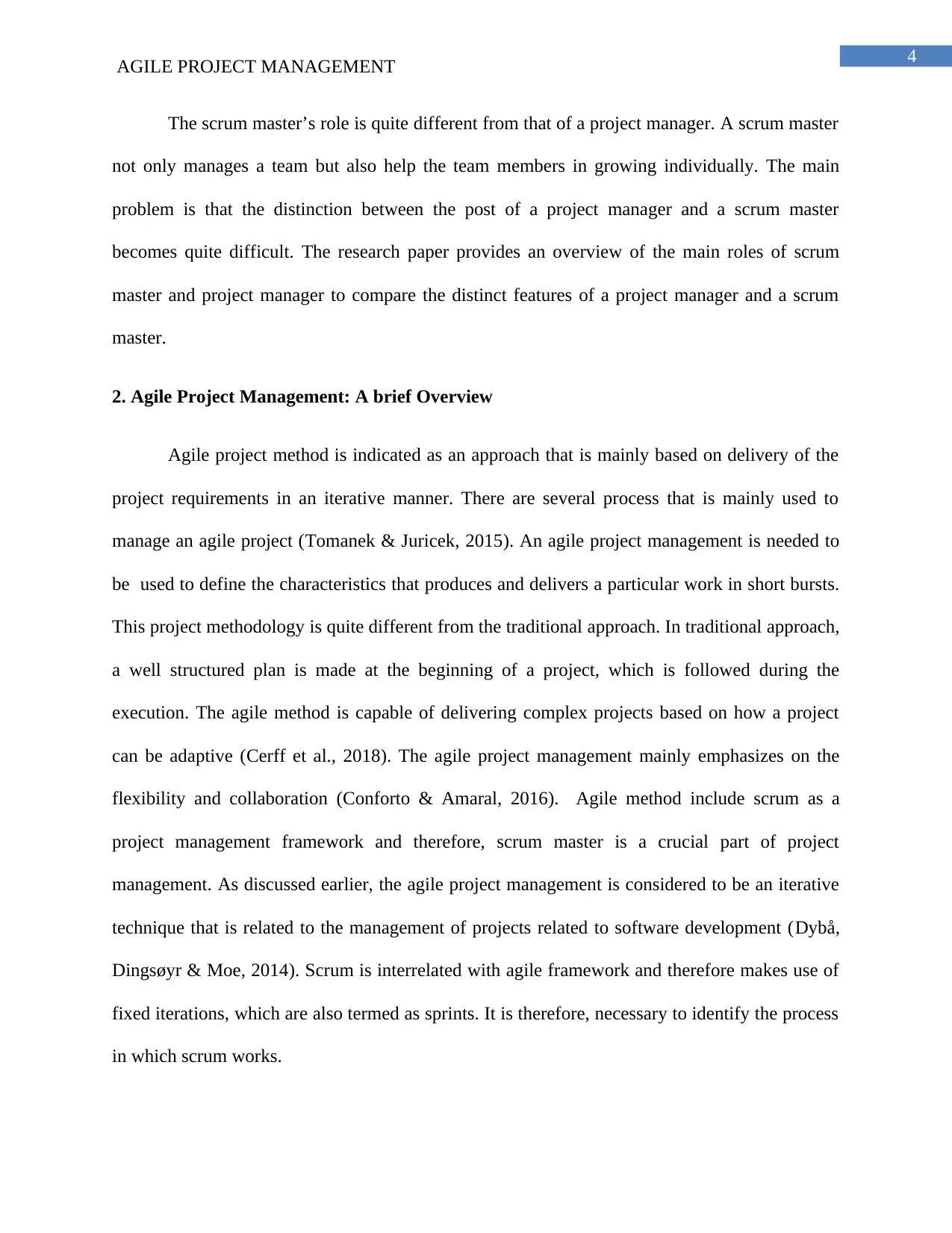
4
AGILE PROJECT MANAGEMENT
The scrum master’s role is quite different from that of a project manager. A scrum master
not only manages a team but also help the team members in growing individually. The main
problem is that the distinction between the post of a project manager and a scrum master
becomes quite difficult. The research paper provides an overview of the main roles of scrum
master and project manager to compare the distinct features of a project manager and a scrum
master.
2. Agile Project Management: A brief Overview
Agile project method is indicated as an approach that is mainly based on delivery of the
project requirements in an iterative manner. There are several process that is mainly used to
manage an agile project (Tomanek & Juricek, 2015). An agile project management is needed to
be used to define the characteristics that produces and delivers a particular work in short bursts.
This project methodology is quite different from the traditional approach. In traditional approach,
a well structured plan is made at the beginning of a project, which is followed during the
execution. The agile method is capable of delivering complex projects based on how a project
can be adaptive (Cerff et al., 2018). The agile project management mainly emphasizes on the
flexibility and collaboration (Conforto & Amaral, 2016). Agile method include scrum as a
project management framework and therefore, scrum master is a crucial part of project
management. As discussed earlier, the agile project management is considered to be an iterative
technique that is related to the management of projects related to software development (Dybå,
Dingsøyr & Moe, 2014). Scrum is interrelated with agile framework and therefore makes use of
fixed iterations, which are also termed as sprints. It is therefore, necessary to identify the process
in which scrum works.
AGILE PROJECT MANAGEMENT
The scrum master’s role is quite different from that of a project manager. A scrum master
not only manages a team but also help the team members in growing individually. The main
problem is that the distinction between the post of a project manager and a scrum master
becomes quite difficult. The research paper provides an overview of the main roles of scrum
master and project manager to compare the distinct features of a project manager and a scrum
master.
2. Agile Project Management: A brief Overview
Agile project method is indicated as an approach that is mainly based on delivery of the
project requirements in an iterative manner. There are several process that is mainly used to
manage an agile project (Tomanek & Juricek, 2015). An agile project management is needed to
be used to define the characteristics that produces and delivers a particular work in short bursts.
This project methodology is quite different from the traditional approach. In traditional approach,
a well structured plan is made at the beginning of a project, which is followed during the
execution. The agile method is capable of delivering complex projects based on how a project
can be adaptive (Cerff et al., 2018). The agile project management mainly emphasizes on the
flexibility and collaboration (Conforto & Amaral, 2016). Agile method include scrum as a
project management framework and therefore, scrum master is a crucial part of project
management. As discussed earlier, the agile project management is considered to be an iterative
technique that is related to the management of projects related to software development (Dybå,
Dingsøyr & Moe, 2014). Scrum is interrelated with agile framework and therefore makes use of
fixed iterations, which are also termed as sprints. It is therefore, necessary to identify the process
in which scrum works.
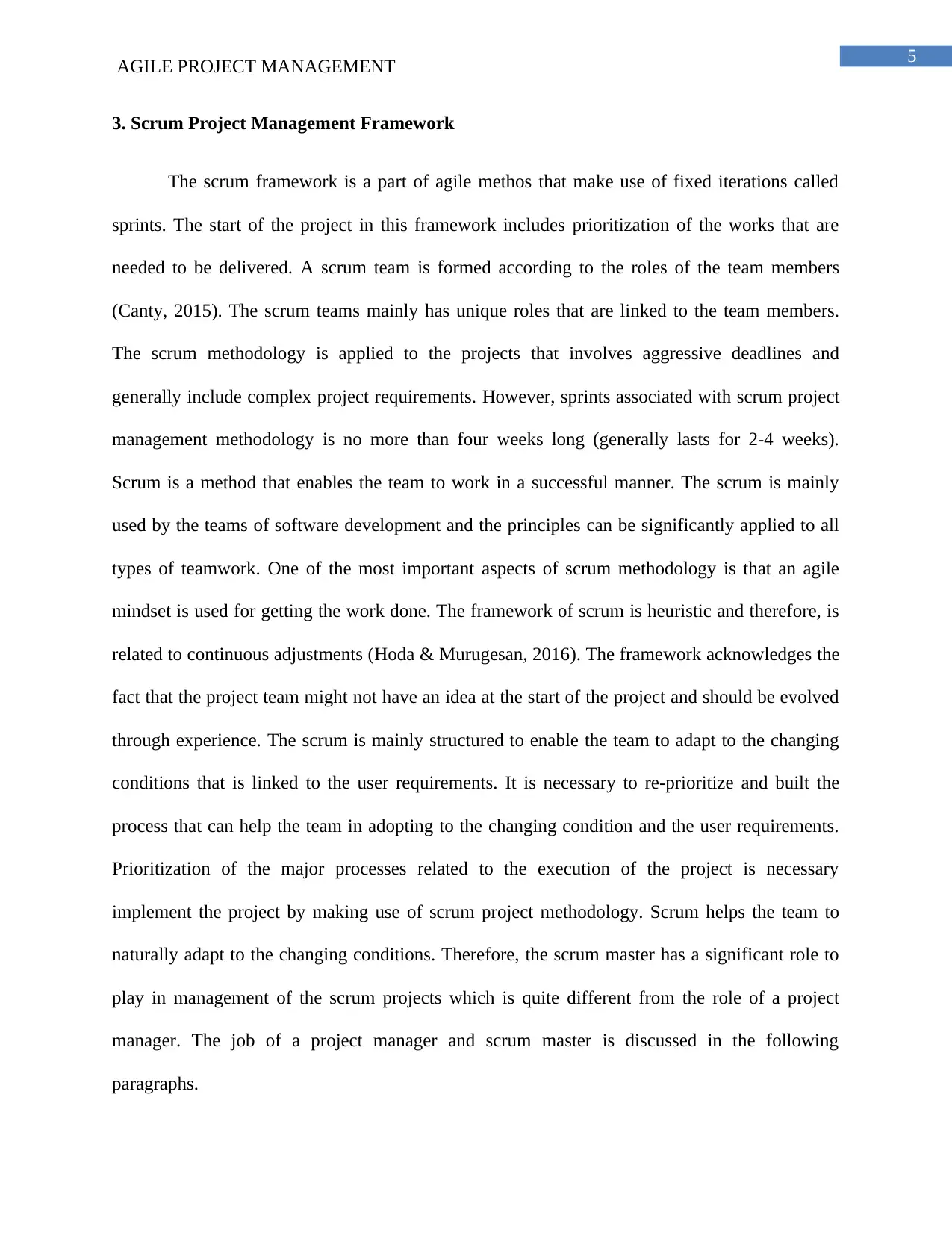
5
AGILE PROJECT MANAGEMENT
3. Scrum Project Management Framework
The scrum framework is a part of agile methos that make use of fixed iterations called
sprints. The start of the project in this framework includes prioritization of the works that are
needed to be delivered. A scrum team is formed according to the roles of the team members
(Canty, 2015). The scrum teams mainly has unique roles that are linked to the team members.
The scrum methodology is applied to the projects that involves aggressive deadlines and
generally include complex project requirements. However, sprints associated with scrum project
management methodology is no more than four weeks long (generally lasts for 2-4 weeks).
Scrum is a method that enables the team to work in a successful manner. The scrum is mainly
used by the teams of software development and the principles can be significantly applied to all
types of teamwork. One of the most important aspects of scrum methodology is that an agile
mindset is used for getting the work done. The framework of scrum is heuristic and therefore, is
related to continuous adjustments (Hoda & Murugesan, 2016). The framework acknowledges the
fact that the project team might not have an idea at the start of the project and should be evolved
through experience. The scrum is mainly structured to enable the team to adapt to the changing
conditions that is linked to the user requirements. It is necessary to re-prioritize and built the
process that can help the team in adopting to the changing condition and the user requirements.
Prioritization of the major processes related to the execution of the project is necessary
implement the project by making use of scrum project methodology. Scrum helps the team to
naturally adapt to the changing conditions. Therefore, the scrum master has a significant role to
play in management of the scrum projects which is quite different from the role of a project
manager. The job of a project manager and scrum master is discussed in the following
paragraphs.
AGILE PROJECT MANAGEMENT
3. Scrum Project Management Framework
The scrum framework is a part of agile methos that make use of fixed iterations called
sprints. The start of the project in this framework includes prioritization of the works that are
needed to be delivered. A scrum team is formed according to the roles of the team members
(Canty, 2015). The scrum teams mainly has unique roles that are linked to the team members.
The scrum methodology is applied to the projects that involves aggressive deadlines and
generally include complex project requirements. However, sprints associated with scrum project
management methodology is no more than four weeks long (generally lasts for 2-4 weeks).
Scrum is a method that enables the team to work in a successful manner. The scrum is mainly
used by the teams of software development and the principles can be significantly applied to all
types of teamwork. One of the most important aspects of scrum methodology is that an agile
mindset is used for getting the work done. The framework of scrum is heuristic and therefore, is
related to continuous adjustments (Hoda & Murugesan, 2016). The framework acknowledges the
fact that the project team might not have an idea at the start of the project and should be evolved
through experience. The scrum is mainly structured to enable the team to adapt to the changing
conditions that is linked to the user requirements. It is necessary to re-prioritize and built the
process that can help the team in adopting to the changing condition and the user requirements.
Prioritization of the major processes related to the execution of the project is necessary
implement the project by making use of scrum project methodology. Scrum helps the team to
naturally adapt to the changing conditions. Therefore, the scrum master has a significant role to
play in management of the scrum projects which is quite different from the role of a project
manager. The job of a project manager and scrum master is discussed in the following
paragraphs.
⊘ This is a preview!⊘
Do you want full access?
Subscribe today to unlock all pages.

Trusted by 1+ million students worldwide
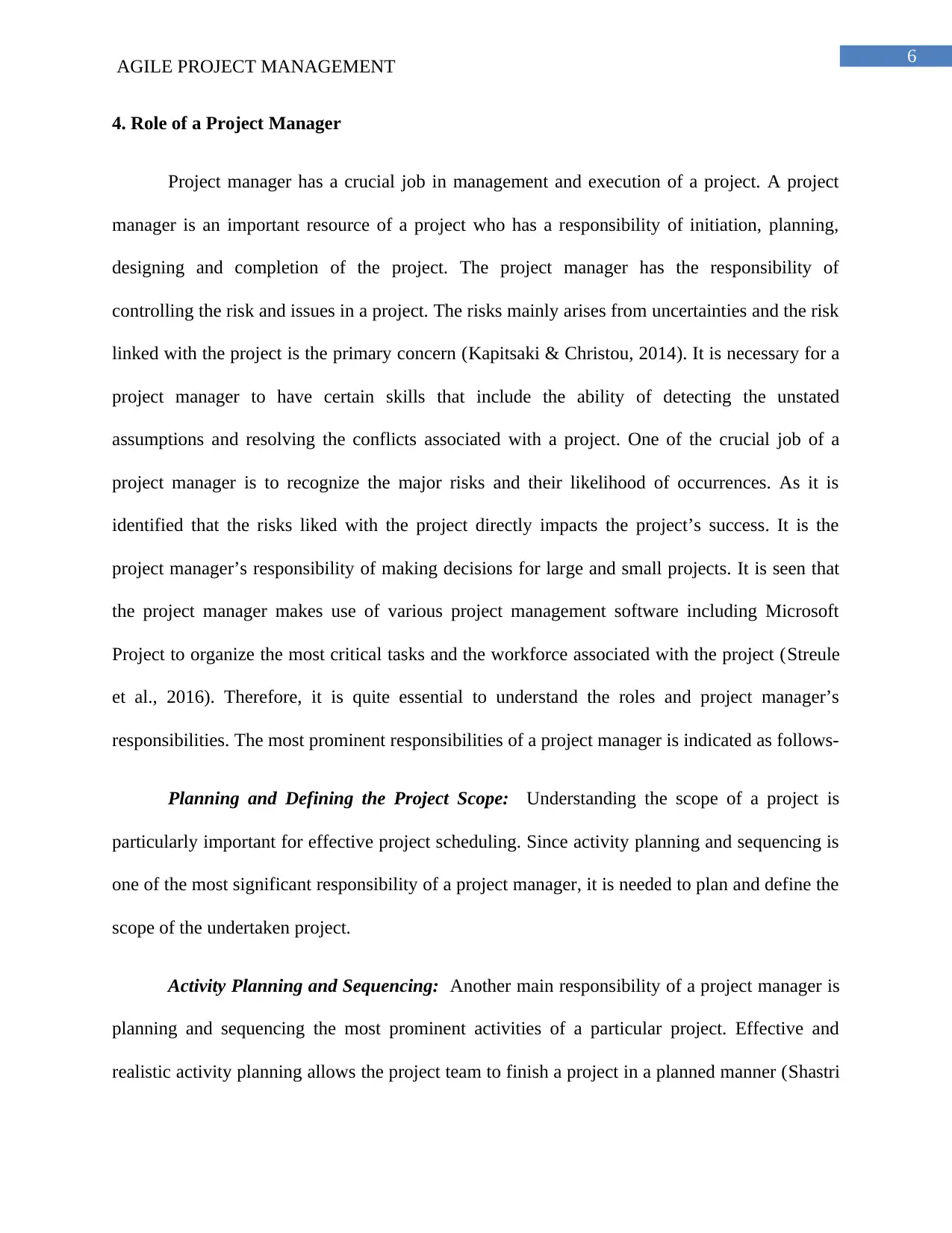
6
AGILE PROJECT MANAGEMENT
4. Role of a Project Manager
Project manager has a crucial job in management and execution of a project. A project
manager is an important resource of a project who has a responsibility of initiation, planning,
designing and completion of the project. The project manager has the responsibility of
controlling the risk and issues in a project. The risks mainly arises from uncertainties and the risk
linked with the project is the primary concern (Kapitsaki & Christou, 2014). It is necessary for a
project manager to have certain skills that include the ability of detecting the unstated
assumptions and resolving the conflicts associated with a project. One of the crucial job of a
project manager is to recognize the major risks and their likelihood of occurrences. As it is
identified that the risks liked with the project directly impacts the project’s success. It is the
project manager’s responsibility of making decisions for large and small projects. It is seen that
the project manager makes use of various project management software including Microsoft
Project to organize the most critical tasks and the workforce associated with the project (Streule
et al., 2016). Therefore, it is quite essential to understand the roles and project manager’s
responsibilities. The most prominent responsibilities of a project manager is indicated as follows-
Planning and Defining the Project Scope: Understanding the scope of a project is
particularly important for effective project scheduling. Since activity planning and sequencing is
one of the most significant responsibility of a project manager, it is needed to plan and define the
scope of the undertaken project.
Activity Planning and Sequencing: Another main responsibility of a project manager is
planning and sequencing the most prominent activities of a particular project. Effective and
realistic activity planning allows the project team to finish a project in a planned manner (Shastri
AGILE PROJECT MANAGEMENT
4. Role of a Project Manager
Project manager has a crucial job in management and execution of a project. A project
manager is an important resource of a project who has a responsibility of initiation, planning,
designing and completion of the project. The project manager has the responsibility of
controlling the risk and issues in a project. The risks mainly arises from uncertainties and the risk
linked with the project is the primary concern (Kapitsaki & Christou, 2014). It is necessary for a
project manager to have certain skills that include the ability of detecting the unstated
assumptions and resolving the conflicts associated with a project. One of the crucial job of a
project manager is to recognize the major risks and their likelihood of occurrences. As it is
identified that the risks liked with the project directly impacts the project’s success. It is the
project manager’s responsibility of making decisions for large and small projects. It is seen that
the project manager makes use of various project management software including Microsoft
Project to organize the most critical tasks and the workforce associated with the project (Streule
et al., 2016). Therefore, it is quite essential to understand the roles and project manager’s
responsibilities. The most prominent responsibilities of a project manager is indicated as follows-
Planning and Defining the Project Scope: Understanding the scope of a project is
particularly important for effective project scheduling. Since activity planning and sequencing is
one of the most significant responsibility of a project manager, it is needed to plan and define the
scope of the undertaken project.
Activity Planning and Sequencing: Another main responsibility of a project manager is
planning and sequencing the most prominent activities of a particular project. Effective and
realistic activity planning allows the project team to finish a project in a planned manner (Shastri
Paraphrase This Document
Need a fresh take? Get an instant paraphrase of this document with our AI Paraphraser
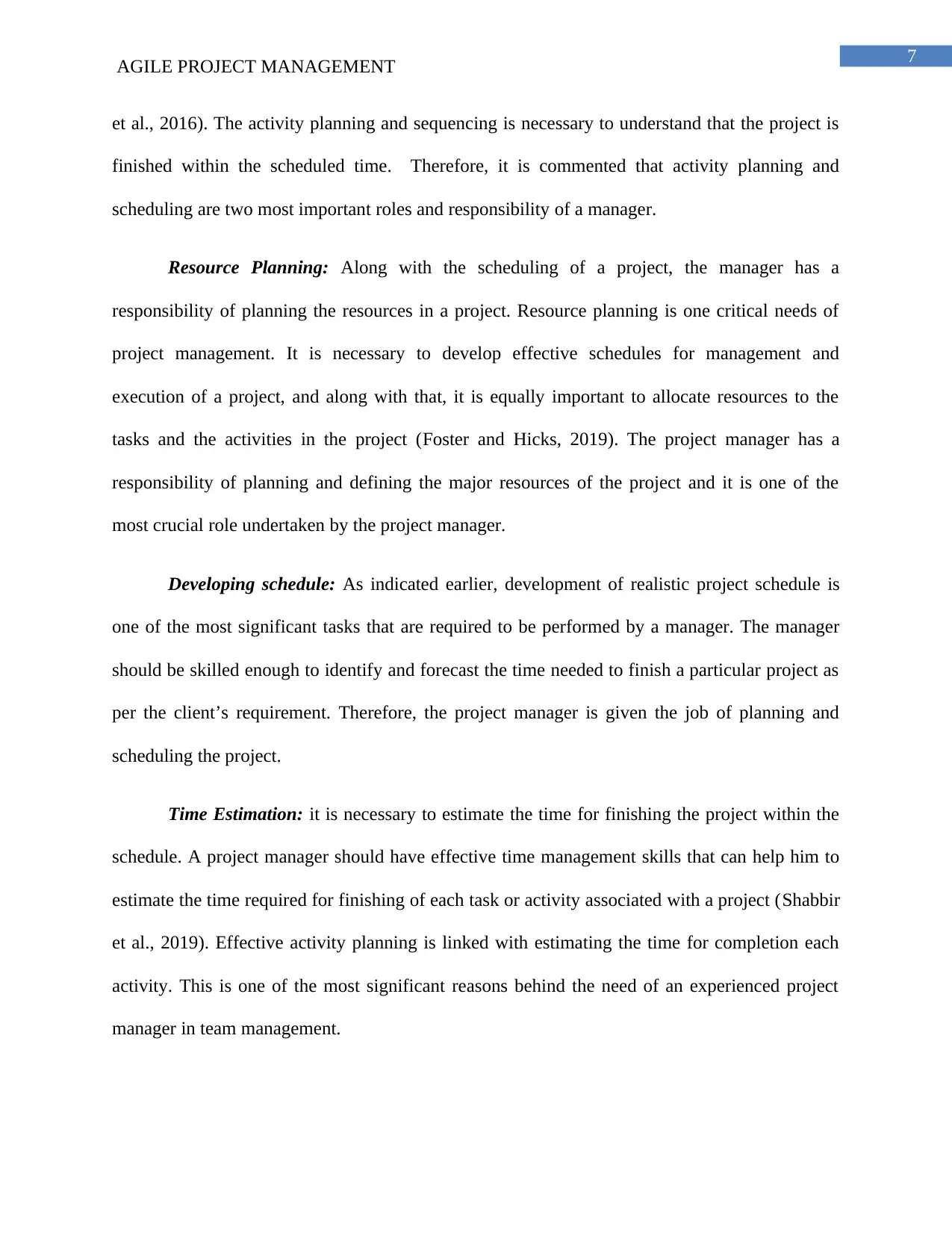
7
AGILE PROJECT MANAGEMENT
et al., 2016). The activity planning and sequencing is necessary to understand that the project is
finished within the scheduled time. Therefore, it is commented that activity planning and
scheduling are two most important roles and responsibility of a manager.
Resource Planning: Along with the scheduling of a project, the manager has a
responsibility of planning the resources in a project. Resource planning is one critical needs of
project management. It is necessary to develop effective schedules for management and
execution of a project, and along with that, it is equally important to allocate resources to the
tasks and the activities in the project (Foster and Hicks, 2019). The project manager has a
responsibility of planning and defining the major resources of the project and it is one of the
most crucial role undertaken by the project manager.
Developing schedule: As indicated earlier, development of realistic project schedule is
one of the most significant tasks that are required to be performed by a manager. The manager
should be skilled enough to identify and forecast the time needed to finish a particular project as
per the client’s requirement. Therefore, the project manager is given the job of planning and
scheduling the project.
Time Estimation: it is necessary to estimate the time for finishing the project within the
schedule. A project manager should have effective time management skills that can help him to
estimate the time required for finishing of each task or activity associated with a project (Shabbir
et al., 2019). Effective activity planning is linked with estimating the time for completion each
activity. This is one of the most significant reasons behind the need of an experienced project
manager in team management.
AGILE PROJECT MANAGEMENT
et al., 2016). The activity planning and sequencing is necessary to understand that the project is
finished within the scheduled time. Therefore, it is commented that activity planning and
scheduling are two most important roles and responsibility of a manager.
Resource Planning: Along with the scheduling of a project, the manager has a
responsibility of planning the resources in a project. Resource planning is one critical needs of
project management. It is necessary to develop effective schedules for management and
execution of a project, and along with that, it is equally important to allocate resources to the
tasks and the activities in the project (Foster and Hicks, 2019). The project manager has a
responsibility of planning and defining the major resources of the project and it is one of the
most crucial role undertaken by the project manager.
Developing schedule: As indicated earlier, development of realistic project schedule is
one of the most significant tasks that are required to be performed by a manager. The manager
should be skilled enough to identify and forecast the time needed to finish a particular project as
per the client’s requirement. Therefore, the project manager is given the job of planning and
scheduling the project.
Time Estimation: it is necessary to estimate the time for finishing the project within the
schedule. A project manager should have effective time management skills that can help him to
estimate the time required for finishing of each task or activity associated with a project (Shabbir
et al., 2019). Effective activity planning is linked with estimating the time for completion each
activity. This is one of the most significant reasons behind the need of an experienced project
manager in team management.
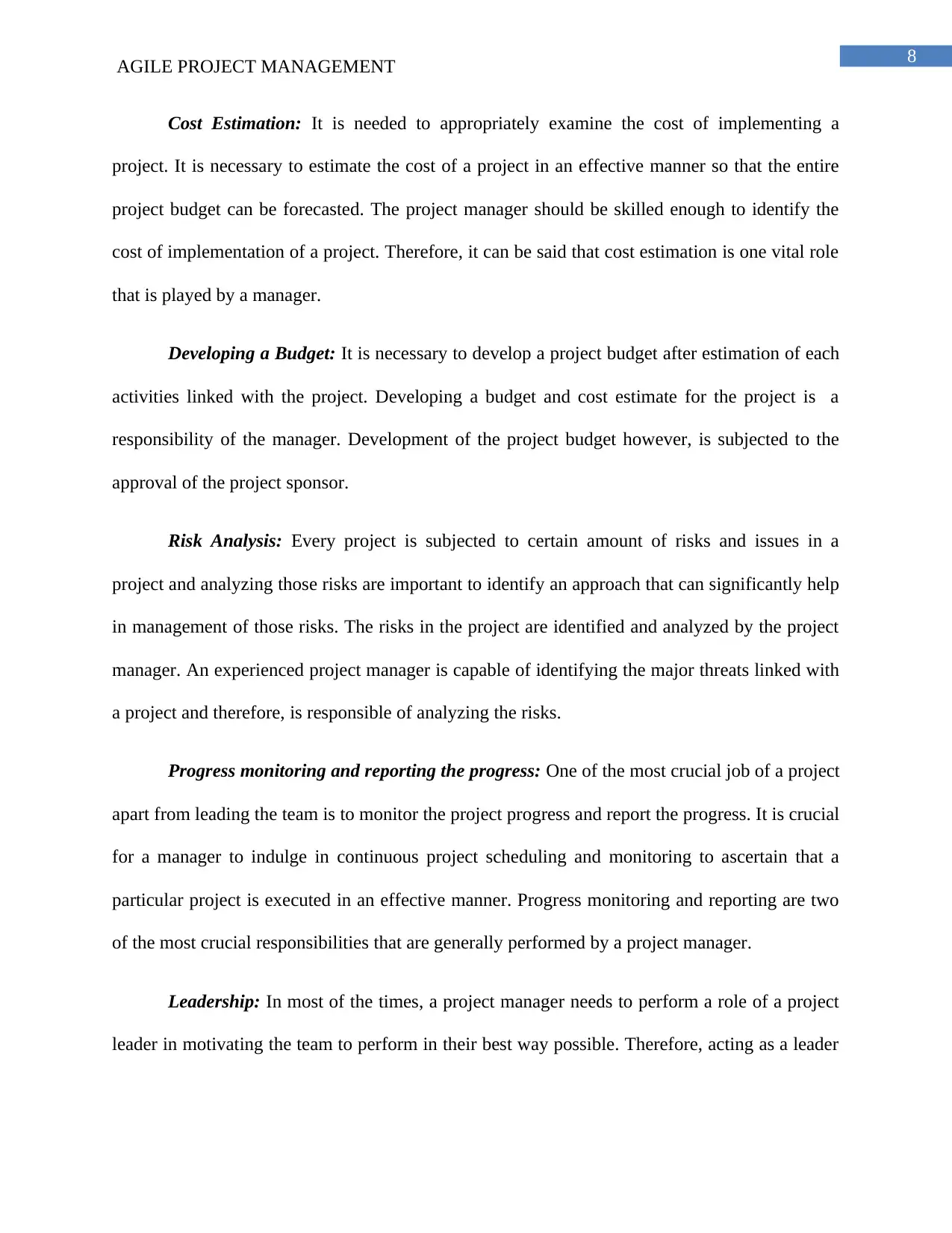
8
AGILE PROJECT MANAGEMENT
Cost Estimation: It is needed to appropriately examine the cost of implementing a
project. It is necessary to estimate the cost of a project in an effective manner so that the entire
project budget can be forecasted. The project manager should be skilled enough to identify the
cost of implementation of a project. Therefore, it can be said that cost estimation is one vital role
that is played by a manager.
Developing a Budget: It is necessary to develop a project budget after estimation of each
activities linked with the project. Developing a budget and cost estimate for the project is a
responsibility of the manager. Development of the project budget however, is subjected to the
approval of the project sponsor.
Risk Analysis: Every project is subjected to certain amount of risks and issues in a
project and analyzing those risks are important to identify an approach that can significantly help
in management of those risks. The risks in the project are identified and analyzed by the project
manager. An experienced project manager is capable of identifying the major threats linked with
a project and therefore, is responsible of analyzing the risks.
Progress monitoring and reporting the progress: One of the most crucial job of a project
apart from leading the team is to monitor the project progress and report the progress. It is crucial
for a manager to indulge in continuous project scheduling and monitoring to ascertain that a
particular project is executed in an effective manner. Progress monitoring and reporting are two
of the most crucial responsibilities that are generally performed by a project manager.
Leadership: In most of the times, a project manager needs to perform a role of a project
leader in motivating the team to perform in their best way possible. Therefore, acting as a leader
AGILE PROJECT MANAGEMENT
Cost Estimation: It is needed to appropriately examine the cost of implementing a
project. It is necessary to estimate the cost of a project in an effective manner so that the entire
project budget can be forecasted. The project manager should be skilled enough to identify the
cost of implementation of a project. Therefore, it can be said that cost estimation is one vital role
that is played by a manager.
Developing a Budget: It is necessary to develop a project budget after estimation of each
activities linked with the project. Developing a budget and cost estimate for the project is a
responsibility of the manager. Development of the project budget however, is subjected to the
approval of the project sponsor.
Risk Analysis: Every project is subjected to certain amount of risks and issues in a
project and analyzing those risks are important to identify an approach that can significantly help
in management of those risks. The risks in the project are identified and analyzed by the project
manager. An experienced project manager is capable of identifying the major threats linked with
a project and therefore, is responsible of analyzing the risks.
Progress monitoring and reporting the progress: One of the most crucial job of a project
apart from leading the team is to monitor the project progress and report the progress. It is crucial
for a manager to indulge in continuous project scheduling and monitoring to ascertain that a
particular project is executed in an effective manner. Progress monitoring and reporting are two
of the most crucial responsibilities that are generally performed by a project manager.
Leadership: In most of the times, a project manager needs to perform a role of a project
leader in motivating the team to perform in their best way possible. Therefore, acting as a leader
⊘ This is a preview!⊘
Do you want full access?
Subscribe today to unlock all pages.

Trusted by 1+ million students worldwide
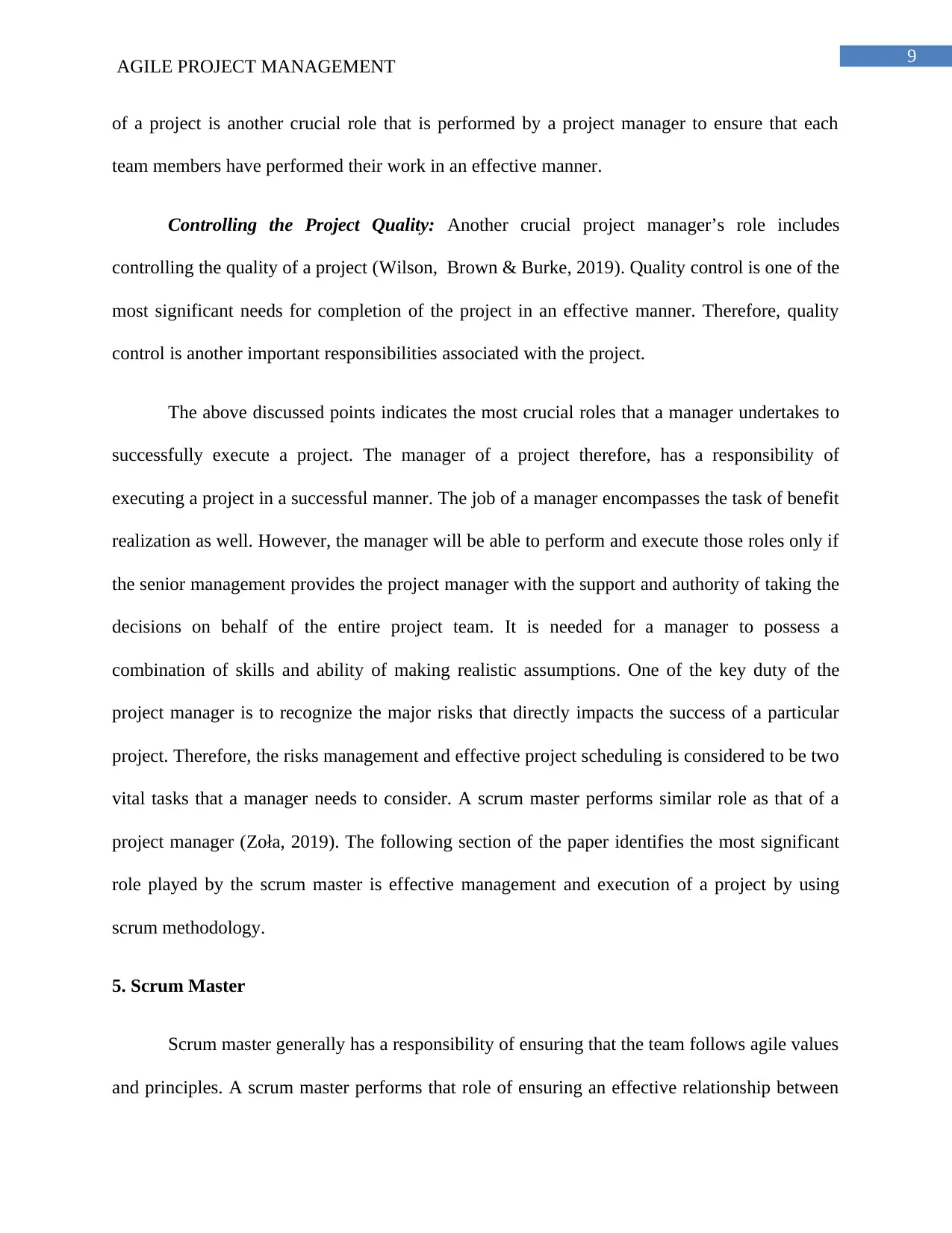
9
AGILE PROJECT MANAGEMENT
of a project is another crucial role that is performed by a project manager to ensure that each
team members have performed their work in an effective manner.
Controlling the Project Quality: Another crucial project manager’s role includes
controlling the quality of a project (Wilson, Brown & Burke, 2019). Quality control is one of the
most significant needs for completion of the project in an effective manner. Therefore, quality
control is another important responsibilities associated with the project.
The above discussed points indicates the most crucial roles that a manager undertakes to
successfully execute a project. The manager of a project therefore, has a responsibility of
executing a project in a successful manner. The job of a manager encompasses the task of benefit
realization as well. However, the manager will be able to perform and execute those roles only if
the senior management provides the project manager with the support and authority of taking the
decisions on behalf of the entire project team. It is needed for a manager to possess a
combination of skills and ability of making realistic assumptions. One of the key duty of the
project manager is to recognize the major risks that directly impacts the success of a particular
project. Therefore, the risks management and effective project scheduling is considered to be two
vital tasks that a manager needs to consider. A scrum master performs similar role as that of a
project manager (Zoła, 2019). The following section of the paper identifies the most significant
role played by the scrum master is effective management and execution of a project by using
scrum methodology.
5. Scrum Master
Scrum master generally has a responsibility of ensuring that the team follows agile values
and principles. A scrum master performs that role of ensuring an effective relationship between
AGILE PROJECT MANAGEMENT
of a project is another crucial role that is performed by a project manager to ensure that each
team members have performed their work in an effective manner.
Controlling the Project Quality: Another crucial project manager’s role includes
controlling the quality of a project (Wilson, Brown & Burke, 2019). Quality control is one of the
most significant needs for completion of the project in an effective manner. Therefore, quality
control is another important responsibilities associated with the project.
The above discussed points indicates the most crucial roles that a manager undertakes to
successfully execute a project. The manager of a project therefore, has a responsibility of
executing a project in a successful manner. The job of a manager encompasses the task of benefit
realization as well. However, the manager will be able to perform and execute those roles only if
the senior management provides the project manager with the support and authority of taking the
decisions on behalf of the entire project team. It is needed for a manager to possess a
combination of skills and ability of making realistic assumptions. One of the key duty of the
project manager is to recognize the major risks that directly impacts the success of a particular
project. Therefore, the risks management and effective project scheduling is considered to be two
vital tasks that a manager needs to consider. A scrum master performs similar role as that of a
project manager (Zoła, 2019). The following section of the paper identifies the most significant
role played by the scrum master is effective management and execution of a project by using
scrum methodology.
5. Scrum Master
Scrum master generally has a responsibility of ensuring that the team follows agile values
and principles. A scrum master performs that role of ensuring an effective relationship between
Paraphrase This Document
Need a fresh take? Get an instant paraphrase of this document with our AI Paraphraser
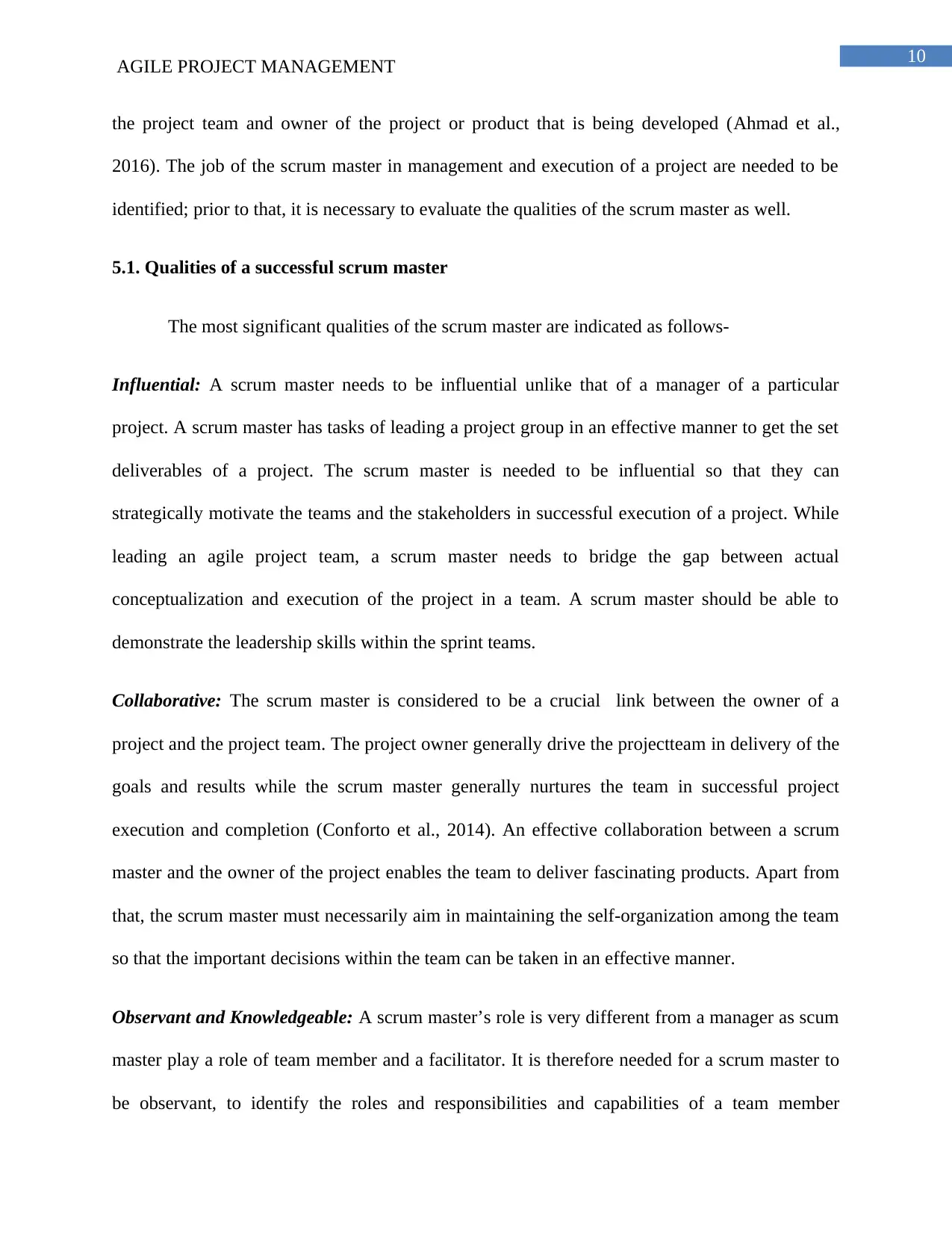
10
AGILE PROJECT MANAGEMENT
the project team and owner of the project or product that is being developed (Ahmad et al.,
2016). The job of the scrum master in management and execution of a project are needed to be
identified; prior to that, it is necessary to evaluate the qualities of the scrum master as well.
5.1. Qualities of a successful scrum master
The most significant qualities of the scrum master are indicated as follows-
Influential: A scrum master needs to be influential unlike that of a manager of a particular
project. A scrum master has tasks of leading a project group in an effective manner to get the set
deliverables of a project. The scrum master is needed to be influential so that they can
strategically motivate the teams and the stakeholders in successful execution of a project. While
leading an agile project team, a scrum master needs to bridge the gap between actual
conceptualization and execution of the project in a team. A scrum master should be able to
demonstrate the leadership skills within the sprint teams.
Collaborative: The scrum master is considered to be a crucial link between the owner of a
project and the project team. The project owner generally drive the projectteam in delivery of the
goals and results while the scrum master generally nurtures the team in successful project
execution and completion (Conforto et al., 2014). An effective collaboration between a scrum
master and the owner of the project enables the team to deliver fascinating products. Apart from
that, the scrum master must necessarily aim in maintaining the self-organization among the team
so that the important decisions within the team can be taken in an effective manner.
Observant and Knowledgeable: A scrum master’s role is very different from a manager as scum
master play a role of team member and a facilitator. It is therefore needed for a scrum master to
be observant, to identify the roles and responsibilities and capabilities of a team member
AGILE PROJECT MANAGEMENT
the project team and owner of the project or product that is being developed (Ahmad et al.,
2016). The job of the scrum master in management and execution of a project are needed to be
identified; prior to that, it is necessary to evaluate the qualities of the scrum master as well.
5.1. Qualities of a successful scrum master
The most significant qualities of the scrum master are indicated as follows-
Influential: A scrum master needs to be influential unlike that of a manager of a particular
project. A scrum master has tasks of leading a project group in an effective manner to get the set
deliverables of a project. The scrum master is needed to be influential so that they can
strategically motivate the teams and the stakeholders in successful execution of a project. While
leading an agile project team, a scrum master needs to bridge the gap between actual
conceptualization and execution of the project in a team. A scrum master should be able to
demonstrate the leadership skills within the sprint teams.
Collaborative: The scrum master is considered to be a crucial link between the owner of a
project and the project team. The project owner generally drive the projectteam in delivery of the
goals and results while the scrum master generally nurtures the team in successful project
execution and completion (Conforto et al., 2014). An effective collaboration between a scrum
master and the owner of the project enables the team to deliver fascinating products. Apart from
that, the scrum master must necessarily aim in maintaining the self-organization among the team
so that the important decisions within the team can be taken in an effective manner.
Observant and Knowledgeable: A scrum master’s role is very different from a manager as scum
master play a role of team member and a facilitator. It is therefore needed for a scrum master to
be observant, to identify the roles and responsibilities and capabilities of a team member
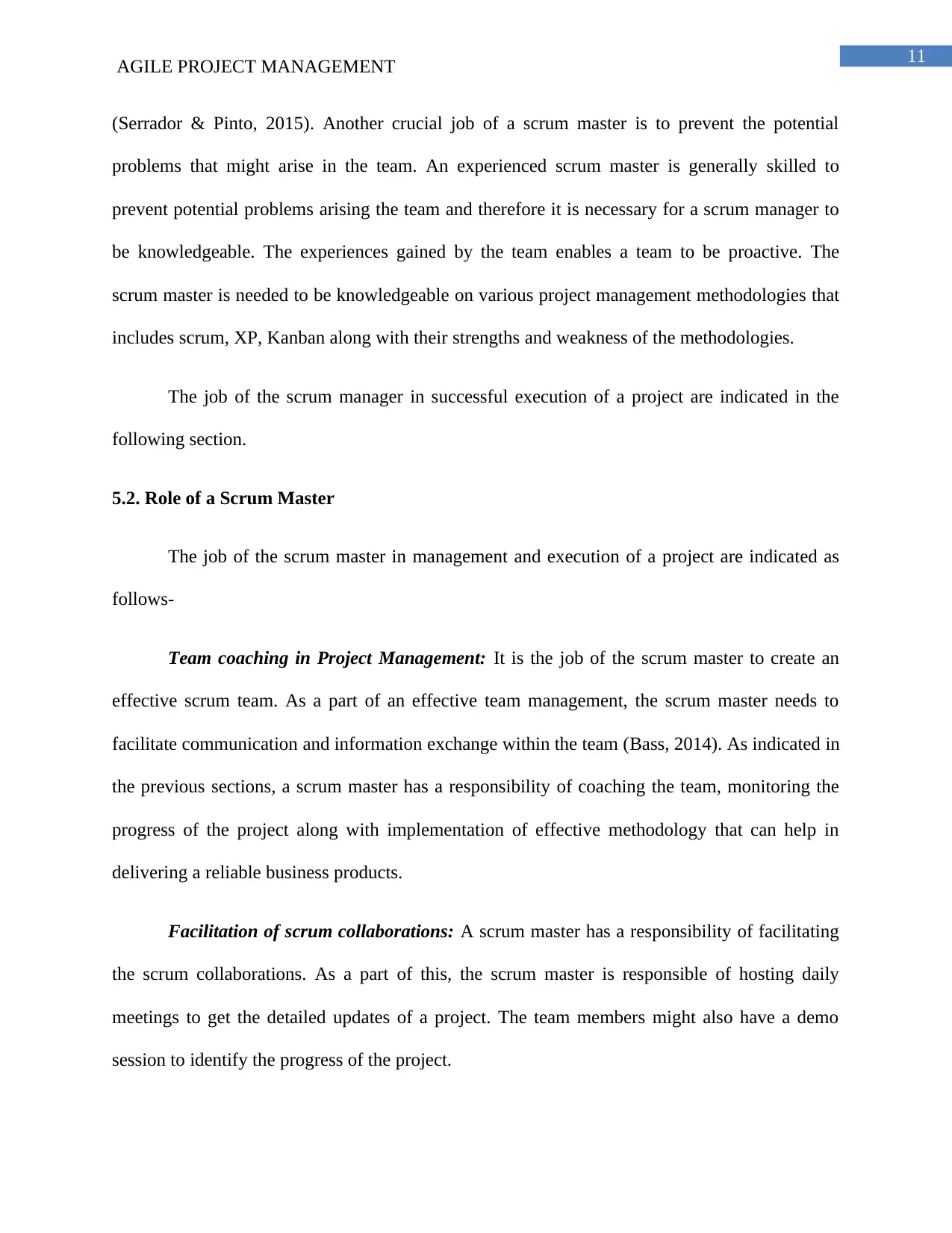
11
AGILE PROJECT MANAGEMENT
(Serrador & Pinto, 2015). Another crucial job of a scrum master is to prevent the potential
problems that might arise in the team. An experienced scrum master is generally skilled to
prevent potential problems arising the team and therefore it is necessary for a scrum manager to
be knowledgeable. The experiences gained by the team enables a team to be proactive. The
scrum master is needed to be knowledgeable on various project management methodologies that
includes scrum, XP, Kanban along with their strengths and weakness of the methodologies.
The job of the scrum manager in successful execution of a project are indicated in the
following section.
5.2. Role of a Scrum Master
The job of the scrum master in management and execution of a project are indicated as
follows-
Team coaching in Project Management: It is the job of the scrum master to create an
effective scrum team. As a part of an effective team management, the scrum master needs to
facilitate communication and information exchange within the team (Bass, 2014). As indicated in
the previous sections, a scrum master has a responsibility of coaching the team, monitoring the
progress of the project along with implementation of effective methodology that can help in
delivering a reliable business products.
Facilitation of scrum collaborations: A scrum master has a responsibility of facilitating
the scrum collaborations. As a part of this, the scrum master is responsible of hosting daily
meetings to get the detailed updates of a project. The team members might also have a demo
session to identify the progress of the project.
AGILE PROJECT MANAGEMENT
(Serrador & Pinto, 2015). Another crucial job of a scrum master is to prevent the potential
problems that might arise in the team. An experienced scrum master is generally skilled to
prevent potential problems arising the team and therefore it is necessary for a scrum manager to
be knowledgeable. The experiences gained by the team enables a team to be proactive. The
scrum master is needed to be knowledgeable on various project management methodologies that
includes scrum, XP, Kanban along with their strengths and weakness of the methodologies.
The job of the scrum manager in successful execution of a project are indicated in the
following section.
5.2. Role of a Scrum Master
The job of the scrum master in management and execution of a project are indicated as
follows-
Team coaching in Project Management: It is the job of the scrum master to create an
effective scrum team. As a part of an effective team management, the scrum master needs to
facilitate communication and information exchange within the team (Bass, 2014). As indicated in
the previous sections, a scrum master has a responsibility of coaching the team, monitoring the
progress of the project along with implementation of effective methodology that can help in
delivering a reliable business products.
Facilitation of scrum collaborations: A scrum master has a responsibility of facilitating
the scrum collaborations. As a part of this, the scrum master is responsible of hosting daily
meetings to get the detailed updates of a project. The team members might also have a demo
session to identify the progress of the project.
⊘ This is a preview!⊘
Do you want full access?
Subscribe today to unlock all pages.

Trusted by 1+ million students worldwide
1 out of 17
Related Documents
Your All-in-One AI-Powered Toolkit for Academic Success.
+13062052269
info@desklib.com
Available 24*7 on WhatsApp / Email
![[object Object]](/_next/static/media/star-bottom.7253800d.svg)
Unlock your academic potential
Copyright © 2020–2026 A2Z Services. All Rights Reserved. Developed and managed by ZUCOL.





